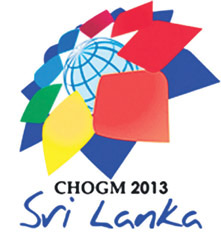
Profiles of Commonwealth member-countries
Compiled by Manjula Fernando
The origins of the Commonwealth lie in the former British Empire but
today it is an inter governmental organization of 54 nations which has
equal status 'regardless of size or economic stature'. It means even the
smallest country has a say in shaping The Commonwealth Policy. The
Commonwealth today comprises number of states which has no shared
history with the British Monarchy.
Thirty two member countries of the commonwealth are classified as
small states with a population of 1.5 million or less.
Following are brief profiles of member countries and their history to
the commonwealth. This week's article, the second in a series of four,
features 12 states which have become members of the Commonwealth between
1962 to 1966.
The Commonwealth Heads of Government Meeting (CHOGM) 2013 and its
side events will be held from November 10 to 17 in selected venues in
Colombo, Galle and Hambantota.
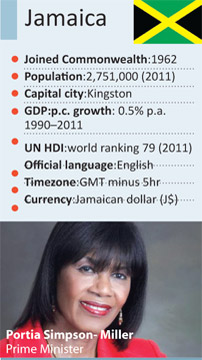 |
Jamaica
Known as the 'Land of Wood and Water', Jamaica lies south of Cuba and
west of Haiti. Patricia Francis of Jamaica was in 2010 appointed to the
Commonwealth Eminent Persons Group in October 2011. Jamaicans hold four
Commonwealth Games records and three world records.
Four Jamaican women have won Commonwealth Writers' Prizes: Olive
Senior in 1987 (Best Book); Erna Brodber in 1989; Alecia McKenzie in
1993; and Vanessa Spence in 1994. The Commonwealth Library Association
has its secretariat at the Mona, Kingston, campus of the University of
the West Indies.
Like Trinidad and Tobago the country has no railway. Jamaica is a
member of the African, Caribbean and Pacific Group of States,
Association of Caribbean States, Caribbean Community, Non-Aligned
Movement, Organization of American States, UN and WTO. Pollution of
coastal waters, damage to coral reefs and air pollution in Kingston are
among significant environment issues.
|
 |
Zambia
It is one of seven landlocked Commonwealth countries. Zambia is a
fertile and mineral-rich country on the Southern African plateau. The
Commonwealth Youth Programme Africa Centre is based in Lusaka. Kalusha
Bwalya, born in Mufulira in 1963, was African Footballer of the Year in
1988. Zambia is a member of the African, Caribbean and Pacific Group of
States, African Union, Common Market for Eastern and Southern Africa,
Non-Aligned Movement, Southern African Development Community, UN and
WTO.
The Forest - mostly savannah bushveld - covers 67% of the land area.
Zambia has a wealth of wildlife, including big mammals and species of
antelopes.
Significant environment issues include air pollution and resulting
acid rain in the areas surrounding mining and refining operations in
Copperbelt Province, inadequate water treatment facilities and poaching.
|
 |
Barbados
Barbados is the most easterly of the Caribbean islands.
Sir Garfield Sobers, born in Bridgetown in July 1936, was the Wisden
Leading Cricketer in the World for eight years.
Austin Ardinel Chesterfield Clarke, born in St James, Barbados, in
July 1934, won the 2003 Commonwealth Writers' Prize with his tenth
published novel, The Polished Hoe.
Barbados is a member of the African, Caribbean and Pacific Group of
States, Association of Caribbean States, Caribbean Community,
Non-Aligned Movement, Organization of American States, UN and WTO.
The most significant environmental issues are pollution of coastal
waters from waste disposal by ships, soil erosion and contamination of
underground water supply.
|
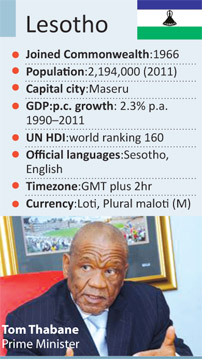 |
Lesotho
Known as the mountain Kingdom, the Kingdom of Lesotho is a small
landlocked country entirely surrounded by South Africa. The country is
divided into ten districts, each named after the principal town. Lesotho
is a monarchy. It is a member of the African, Caribbean and Pacific
Group of States, African Union, Non-Aligned Movement, UN and WTO among
others.
The country is well-watered in a generally dry region, the Orange
river and its tributary the Caledon rises in Lesotho. The country
exports water to South Africa. The most significant environment issue is
overgrazing, resulting in severe soil erosion and desertification.
*Gambia - Gambia which joined Commonwealth of Nations in 1965
withdrew from it after 48 years, in early October 2013.
|
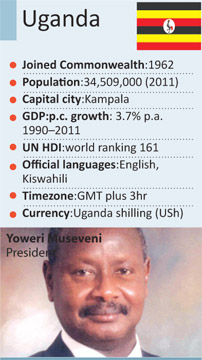 |
Uganda
Uganda is an East African country bordered by Sudan, Kenya, United
Republic of Tanzania, Rwanda and the Democratic Republic of Congo.
The country will host the Commonwealth Local Government Conference in
May 2013. Samuel Kavuma of Uganda was appointed to the Commonwealth
Eminent Persons Group in 2010. Uganda is a member of the African,
Caribbean and Pacific Group of States, African Union, Common Market for
Eastern and Southern Africa, East African Community, Non-Aligned
Movement, OIC, UN and the WTO.
There is a rich variety of wildlife, including elephants, Uganda kob,
lions, rhinos, mountain gorillas and chimpanzees. A total of 338 species
of mammals and 830 species of birds live there. The most significant
issues include draining of wetlands for agricultural use, deforestation
and poaching.
|
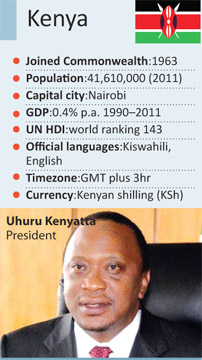 |
Kenya
Kenya lies astride the equator and borders Uganda, Sudan, Ethiopia,
Somalia and Tanzania. The country is divided into eight provinces.
The father of US President Barack Obama was a Kenyan national. Its
athletes hold eight Commonwealth Games records and nineteen world
records. The country hosts a national chapter of the Commonwealth Human
Ecology Council. Kenya hosts the headquarters of the United Nations
Environment Programme and UNHabitat. Kenya is a member of the African,
Caribbean and Pacific Group of States, African Union, Indian Ocean Rim
Association for Regional Cooperation, Non-Aligned Movement, UN and WTO
among others.
Kenya's wildlife is probably the most famous in the world. Wild
mammals include lions, leopards, cheetahs, zebras, antelopes, gazelles,
elephants, rhinoceroses, hippopotamus, baboons and many kinds of
monkeys. There are 359 recorded species of mammals, of which 51 are
endangered. Soil erosion, desertification and poaching are among key
environment issues facing the country.
|
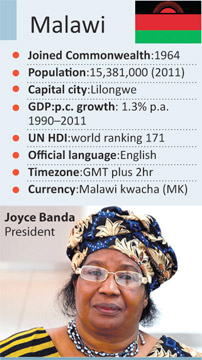 |
Malawi
Malawi is a long, narrow south-east African country shaped by the
Rift Valley and is bordered by Mozambique, Zambia and Tanzania.
Malawi is one of seven landlocked Commonwealth countries, all of
which are in Africa.
Malawi has one of the lowest per capita incomes in the Commonwealth,
but its economy has grown at 7.5% a year over 2007-11.
It is a member of the African, Caribbean and Pacific Group of States,
African Union, Common Market for Eastern and Southern Africa,
Non-Aligned Movement, UN and WTO.
The country faces deforestation and water pollution among other
environment issues.
|
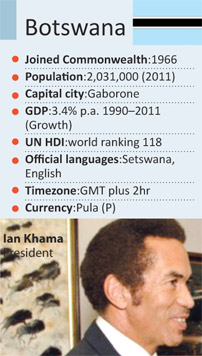 |
Botswana
The Republic of Botswana is a large, roughly circular, landlocked
plateau in the centre of Southern Africa, bordered by South Africa,
Namibia, Zambia and Zimbabwe.
Scholarships for postgraduate study are awarded by Botswana to
citizens of other Commonwealth countries. Botswana was the largest
producer of gem-quality diamonds in the world in 2011, a position held
by Australia till 1999.
Botswana is a member of the African, Caribbean and Pacific Group of
States, African Union, Non-Aligned Movement, Southern African Customs
Union, Southern African Development Community, UN and WTO.
The most significant environmental issues are overgrazing,
desertification and limited resources of fresh water.
|
 |
Trinidad and Tobago
The country situated off the Venezuelan coast consists of two
islands; Trinidad and Tobago.
The country has no railway. Port of Spain and Point Lisas are the
main ports.
Tourist cruiseships dock in Scarborough and Port of Spain.
Trinidad and Tobago is a member of the African, Caribbean and Pacific
Group of States, Association of Caribbean States, Caribbean Community,
Non-Aligned Movement, Organization of American States, Un and WTO.
The Pitch Lake in the south- west is the world's largest natural
reservoir of asphalt.
The forest which is tropical evergreen covers 44% of the land. The
most significant environment issues include water pollution and oil
pollution of beaches.
|
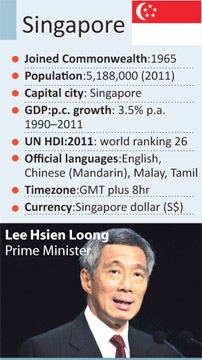 |
Singapore
Singapore which is the 'City of Lions' in Sanskrit, is part of south
east Asia. A number of smaller islands are included within its
boundaries and the country is separated from Malaysia by Johor Straits.
Singapore has an excellent harbour and is one of the world's busiest
ports. It has won the annual Commonwealth Essay Competition nine times,
no other country has won more than three times. Singapore is by far the
most densely populated country in the Commonwealth. Scholarships for
postgraduate study in integrative sciences and engineering are awarded
by Singapore to citizens of other Commonwealth countries.
Singapore is a member of Asia-Pacific Economic Cooperation,
Association of Southeast Asian Nations, Indian Ocean Rim Association for
Regional Cooperation, Non-Aligned Movement, UN and WTO. Singapore hosts
the headquarters of Asia-Pacific Economic Cooperation.
Despite the urbanisation of the country, there are over 300 species
of birds. Industrial pollution and seasonal haze resulting from forest
fires in Indonesia are significant environment issues.
|
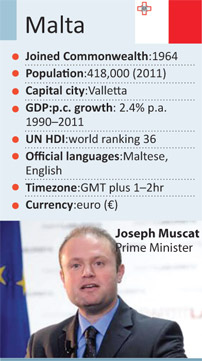 |
Malta
The Republic of Malta comprises an archipelago of six islands and
islets in the middle of the Mediterranean Sea.
The Commonwealth Network of Information Technology for Development
(COMNET-IT) has its secretariat in Valletta.
Malta is a member of the Council of Europe, European Union,
Organization for Security and Co-operation in Europe, UN and WTO.
There are no rivers, streams or lakes on Malta Island. Limited
freshwater resource is a major environment issue facing the country.
|
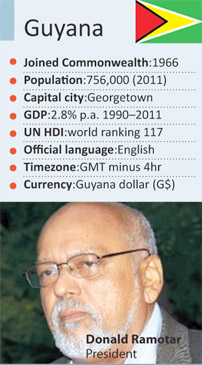 |
Guyana
The Co-operative Republic of Guyana lies in the north-east of South
America. It is bordered by Suriname, Brazil and Venezuela. The country
comprises ten regions.
Sir Shridath Ramphal of Guyana was Commonwealth Secretary-General
1975-90. Guyanese writers have won the overall Best First Book award of
the Commonwealth Writers' Prize in 1991 (Pauline Melville) and in 2006
(Mark McWatt).
The Commonwealth Youth Programme Caribbean Centre is based in
Georgetown.
In 1989 Guyana offered 360,000 hectares of pristine rainforest the
Commonwealth's flagship Iwokrama Rainforest Programme. The Commonwealth
Youth Programme Caribbean Centre is based in Georgetown.
Guyana is a member of the African, Caribbean and Pacific Group of
States, Association of Caribbean States, Caribbean Community, Non
Aligned Movement, Organisation of Islamic Cooperation, Organization of
American States, UN and WTO.
Guyana's tropical forest, covering 77% of the land area, is among the
most ecologically valuable and best preserved in the world. The
environment is an issue of great political importance in Guyana.
The most pressing environment issues include water pollution and
deforestation. |
|
|
|

